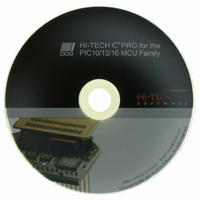SW500010 Microchip Technology, SW500010 Datasheet - Page 33

SW500010
Manufacturer Part Number
SW500010
Description
HI-TECH C PRO FOR PIC10/12/16
Manufacturer
Microchip Technology
Type
Compilerr
Series
PIC10/12/16r
Specifications of SW500010
Supported Families
PIC10, PIC12, PIC16
Core Architecture
PIC
Software Edition
Professional
Kit Contents
Software And Docs
Mcu Supported Families
PIC10/12/16
Tool Type
Compiler
Lead Free Status / RoHS Status
Not applicable / Not applicable
For Use With/related Products
PIC10, PIC12, PIC14, PIC16, PIC16E
Lead Free Status / Rohs Status
Lead free / RoHS Compliant
Other names
019P
778-1006
778-1006
778-1006
778-1006
- Current page: 33 of 502
- Download datasheet (3Mb)
PICC Command-line Driver
modification of the linker options, and the command-line driver will automatically check the size of
these psects to determine if block-clear code is required. Variables placed into psects other than the
compiler-defined bss psects will not be cleared at startup by default.
be omitted by disabling the clear suboption of --RUNTIME. For example:
With this part of the runtime startup code absent, the contents of uninitialized variables will be
unpredictable when the program begins execution.
with persistent. See Section
different area of memory and are not altered by the runtime startup code in anyway.
2.3.3 The Powerup Routine
Some hardware configurations require special initialization, often within the first few instruction
cycles after reset. To achieve this there is a hook to the reset vector provided via the powerup
routine.
ately after reset. An empty powerup routine is provided in the file powerup.as which is located
in the SOURCES directory of your compiler distribution. Refer to comments in this file for more
details.
a source file. No special linker options or other code is required; the compiler will detect if you
have defined a powerup routine and will automatically use it, provided the code in this routine is
contained in a psect called powerup.
must contain at its end a GOTO instruction to the label called start. As with all user-defined as-
sembly code, it must take into consideration program memory paging and/or data memory banking,
as well as any applicable errata issues for the device you are using. The program’s entry point is
already defined by the runtime startup code, so this should not be specified in the powerup routine
at the END directive (if used). See Section
2.3.4 The printf Routine
The code associated with the printf function is not found in the library files. The printf
function is generated from a special C source file that is customized after analysis of the user’s C
code. See page
The block clear of all the bss psects (including the memory allocated by the code generator) can
Variables whose contents should be preserved over a reset, or even power off, should be qualified
This routine can be supplied in a user-defined assembler module that will be executed immedi-
The file should be copied to your working directory, modified and included into your project as
For correct operation (when using the default compiler-generated runtime startup code), the code
--RUNTIME=default,-clear
265
for more information on the printf library function.
3.3.10.1
4.3.8.2
for more information. Such variables are linked at a
for more information on this assembler directive.
Runtime Files
33
Related parts for SW500010
Image
Part Number
Description
Manufacturer
Datasheet
Request
R

Part Number:
Description:
Manufacturer:
Microchip Technology Inc.
Datasheet:

Part Number:
Description:
Manufacturer:
Microchip Technology Inc.
Datasheet:

Part Number:
Description:
Manufacturer:
Microchip Technology Inc.
Datasheet:

Part Number:
Description:
Manufacturer:
Microchip Technology Inc.
Datasheet:

Part Number:
Description:
Manufacturer:
Microchip Technology Inc.
Datasheet:

Part Number:
Description:
Manufacturer:
Microchip Technology Inc.
Datasheet:

Part Number:
Description:
Manufacturer:
Microchip Technology Inc.
Datasheet:

Part Number:
Description:
Manufacturer:
Microchip Technology Inc.
Datasheet:










